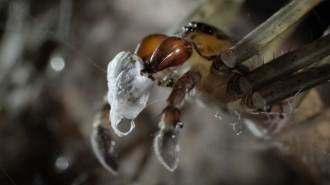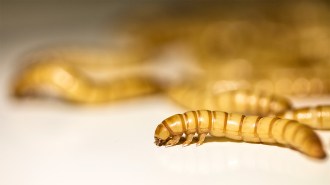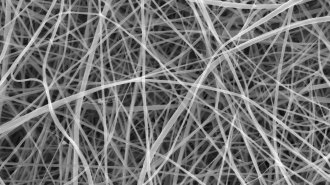All Stories
-
 Astronomy
AstronomyAstronomers see the astrosphere of a sunlike star for the first time
Finding a bubble of hot gas blown by the stellar wind from a young star gives researchers a peek at what our sun was like when it was young.
-
 Health & Medicine
Health & MedicineHow the weight loss drug tirzepatide is also helping heart failure patients
Data continue to show that tirzepatide, called Mounjaro for type 2 diabetes and Zepbound for weight loss, is safe and effective, but side effects remain.
By Meghan Rosen -
 Climate
ClimateClimate change made 2024 the hottest year on record. The heat was deadly
Heat waves fueled by climate change killed scores of people and upended daily life. Here are some of those stories.
By Carolyn Gramling and Nikk Ogasa -
 Plants
PlantsMeet a scientist tracking cactus poaching in the Atacama Desert
Botanist Pablo Guerrero has been visiting Atacama cacti all his life. They’re not adapting well to a drier climate, booming mining and plant collection.
-
 Animals
AnimalsClimate stress may undermine male spiders’ romantic gift giving
Even spider love lives show an effect of climate uncertainty: Stressed males may offer a bit of silk-wrapped junk rather than a tasty insect treat.
By Susan Milius -
 Space
SpaceA spacecraft duo will fly in formation to create artificial solar eclipses
ESA’s Proba-3 mission will use one satellite to block out the sun for another satellite, bringing the sun’s middle corona into new focus.
-
 Humans
HumansDietary evidence bolsters Clovis hunters’ reputation as mammoth killers
Mammoths made up as much as 40 percent of the ancient North Americans’ diet, a chemical analysis of human remains reveals.
By Anna Gibbs -
 Life
LifeTrees are failing to adapt to climate change. Losing fungi partners may be why
Certain fungi give trees nutrients and water, but heat and drought are putting both at risk.
-
 Ecosystems
EcosystemsNew videos reveal the hidden lives of Andean bears
The footage give clues to the range of plants the bears eat and how they mate, information important for conservation.
-
 Life
LifeHere’s how long it would take 100 worms to eat the plastic in one face mask
An experiment reveals that a bio-solution to humans’ microplastics mess is likely to fall short, but could inspire other ways to attack the problem.
By Susan Milius -
 Materials Science
Materials ScienceStarchy nanofibers shatter the record for world’s thinnest pasta
The fibers, made from white flour and formic acid, average just 372 nanometers in diameter and might find use in biodegradable bandages.
By Skyler Ware -
 Animals
AnimalsEthiopian wolves are the first large carnivores found to slurp nectar
Wolves from three different packs were seen licking red hot poker flowers. That sweet tooth could make them the first known large predator pollinators.